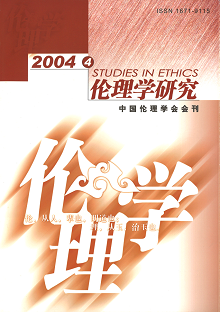|
|
On Kindness between Citizens
HUANG Xianzhong
2004(4):
33-38.
Kindness means goodness between friends originally, As moral norm, kindness refers to friendly moral relations and order between citizens. Citizens' relations and order being kindness because our good-orderly society and its public domain both is morally cooperative systen. Kindness has three functions as standardization,creation, integration. Kindenss has to be cemented for its abstrac into goodness, gentleness, honestness, broad-mindess, equality.and mutualness. Kindness isalso a main moral quality, with which citizens do good things and behave Kindly. Nowadays, citizens suffer three crux about kindness fearfulness named as unconcernedness, shirkingness, which require us to unite ethics, morality, managementetc., establish citizens relations and order from ethical aspect.
|



